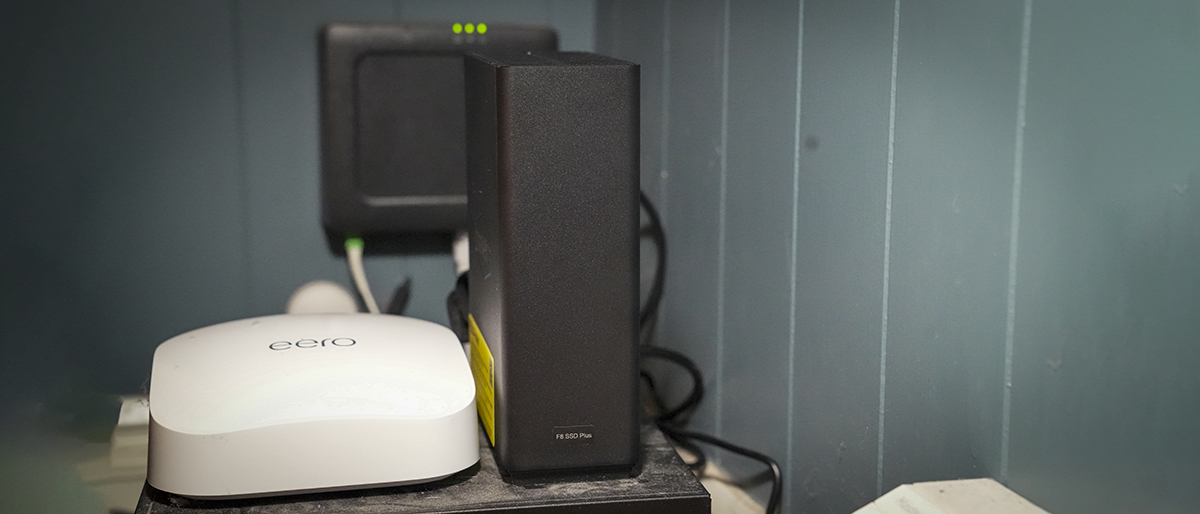TechRadar Verdict
The Terramaster F8 SSD Plus provides high-speed, easy-to-use network storage with impressive flexibility and quiet operation.
Pros
- +
Compact design
- +
Fast performance
- +
Easy setup
Cons
- -
Higher cost than HDD
- -
Some issues with cloud integration
- -
SSD can be expensive
Why you can trust TechRadar
Terramaster F8 SSD Plus: 30-second review
CPU: Intel i3 N305 (up to 3.8 GHz)
RAM: 16 GB DDR5, expandable to 32 GB
Storage: 8 x M.2 NVMe slots, up to 64 TB
Rear Ports: 1 x 10GbE, HDMI, 2 x USB 3.2 (10 Gbps), USB Type-C (10 Gbps)
Size: 177 x 160 x 140 mm
OS: TOS 6, supporting Windows, Mac, Linux
Accessories: Power cord, adapter, network cable, screws
The Terramaster F8 SSD Plus is aimed at the home office and small business user, with a no-fuss approach to ultra-fast network-connected storage. Aesthetically, it looks like a standard desktop external hard drive rather than the larger NAS drives that were used to. This massive reduction in size is due to the SSD storage rather than the more common mechanical HDD type, this both enables the size reduction and a far quieter system than we’d usually expect.
Inside, the F8 SSD Plus has been designed to be as easy to set up as possible, with eight SSD slots that you can configure as you see fit, starting with a minimum of two SSDs and maxing out at eight. While the speed of SSDs is far superior to that of standard HDDs, the capacities are generally far smaller, and again this is the case here, with a maximum of 8TB per slot and a total maximum storage capacity of 64TB with all eight slots filled, which is still impressive considering the size of the box. However, once you configure the RAID type for the drive then that capacity will drop.
After the SSDs are installed, the NAS drive is connected through a network cable to your router. Then, using the link provided in the setup instructions, you can connect directly to the drive before following the rest of the setup guide. The process is extremely smooth and easy to follow.
There are a couple of options as to how you integrate the NAS into your everyday workflow, and for most users, attaching directly to your wireless router and accessing it will be the easiest approach when setting up. Those who want to take full advantage of the speed and abilities of the device can hardwire it through the network to enable speeds that are suitable for network video editing.
While the overall storage capacity might be limited due to SSD technology, the fact that it maxes out at 64TB, before any RAID options have been applied, should be more than enough for most people. Likewise, the speeds through a wireless network are impressive, and this is where it really stands out is with the wired network performance.
If you’re looking for a simple, straightforward NAS system for your home office or business, then the Terramaster F8 SSD Plus is one of the best NAS hard drives we've reviewed. However, it is worth noting that the base cost is expensive and the outlay for SSDs quickly elevates that's price. However, compared with more common HDD NAS systems, if speed is a priority, then at this price it’s well worth considering.
Terramaster F8 SSD Plus: Price & availability
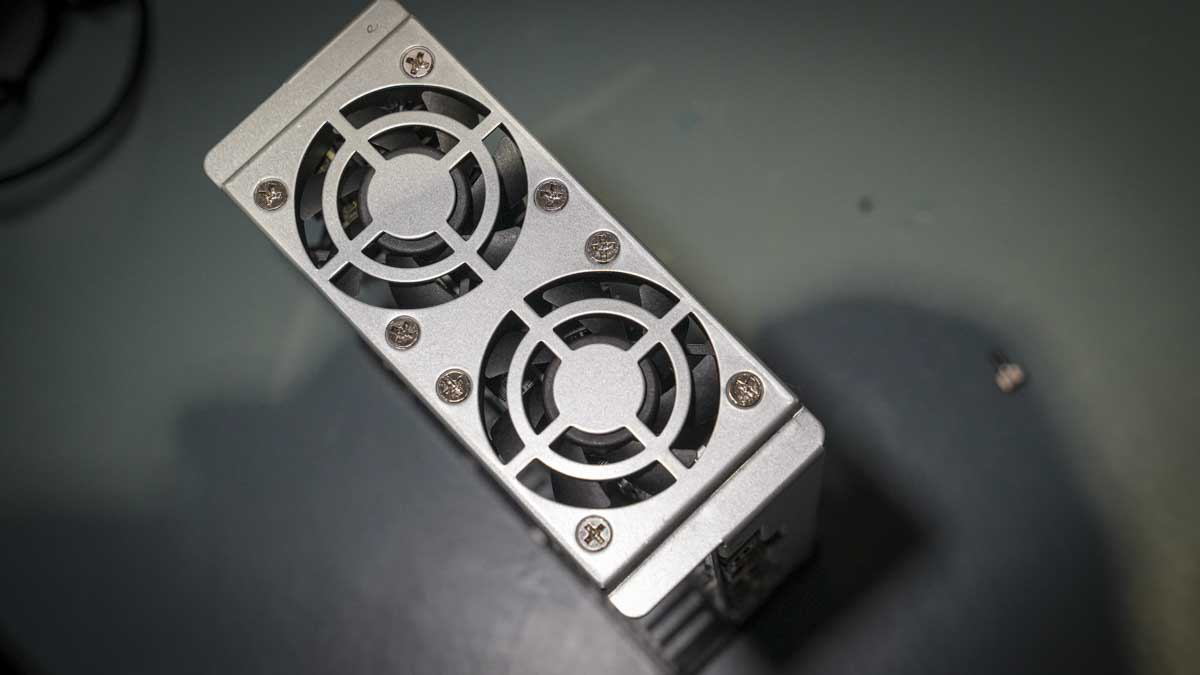
The Terramaster F8 SSD Plus is available globally through major online retailers such as Amazon and the Terramaster website. Pricing starts at a premium $799 for the base unit and then you have the cost of the SSDs on top.
- Score: 4/5
Terramaster F8 SSD Plus: Design & build
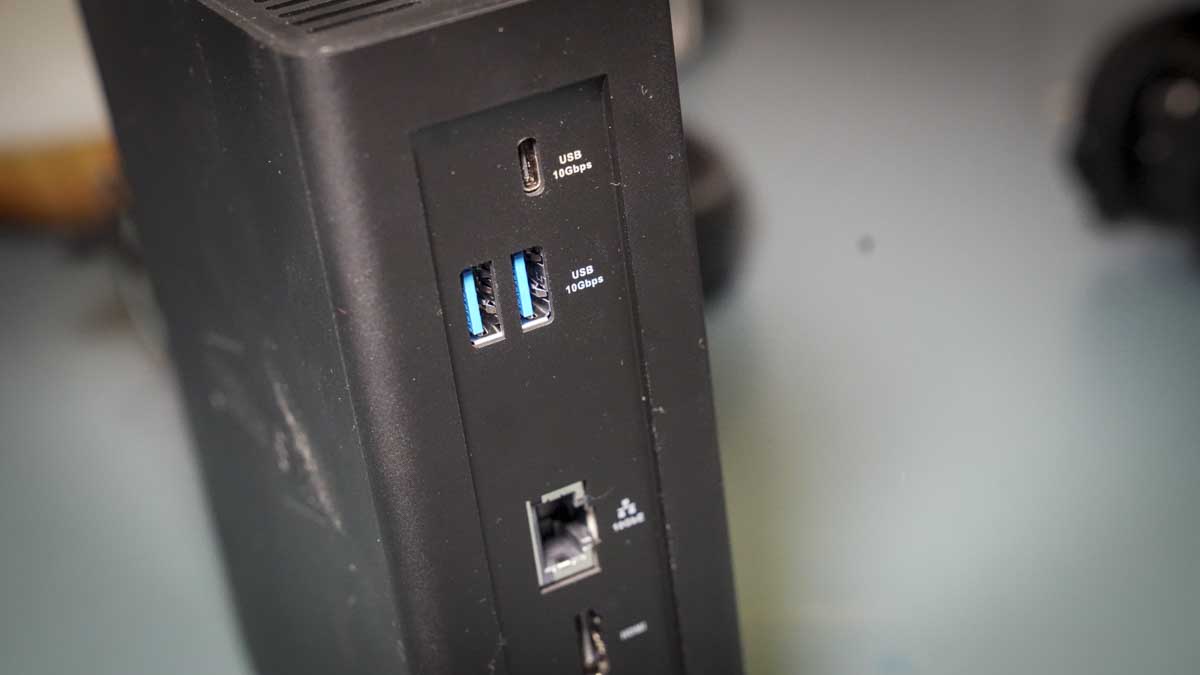
Unlike the majority of consumer NAS drives, the Terramaster F8 SSD resembles a standard external desktop hard drive. It’s relatively small at just 177 x 160 x 140 mm and weighs 1.7 kg before the SSDs are added.
Checking over the design, the only things that would lead you to believe this was anything other than an external hard drive are the two large fans on the base and the 10,000 Mbps Network port and HDMI port on the back, common for NAS but not for external desktop hard drives. Alongside these ports are two USB Type-A and a USB Type-C port for attaching USB storage devices or wireless adapters.
The HDMI port is something you usually see on enterprise models and enables you to plug in a monitor to display software code and commands. When using the HDMI, there's no actual GUI, with everything running from the command-line interface.
Terramaster says that the NAS has tool-free installation, and to a certain extent it does, in as far as it doesn't bolt into a rack. However, once the small securing screw at the back is removed, the outer cover can be lifted away to reveal the inside and the slots for the SSDs. To install the SSDs, a small crosshead screwdriver is required, and thankfully, one is included in the box alongside the unit.
When it comes to installing the SSDs into the slots, this is extremely easy, with each pushing into the slot before being secured by a small screw. As standard, there are eight slots, which you can configure with SSDs as you see fit, with a minimum of two required to take advantage of the RAID features.
For example, if you are using RAID 0, 1, or 5, it's best to match each of the SSDs in capacity and performance to avoid wasting space and throttling the performance of the faster SSDs.
Likewise, if you use JBOD, then the drives don’t have to match, with each being recognised as a separate entity.
One of the main concerns that we had about the drive considering it's performance is heat, with the potential of up to eight SSDs all running at full speed within the device, this could cause relatively high temperatures that could have adverse effects on the performance. Here, Terramaster has utilised the fans on the base of the machine to draw cool air through the system, and there's eight large heat sinks, included in the box, that can be fitted to the individual SSDs as they are installed.
When it comes to design, the F8 SSD Plus is simple and compact, but it packs features and performance that make it an interesting choice for many.
- Design: 4/5
Terramaster F8 SSD Plus: Features
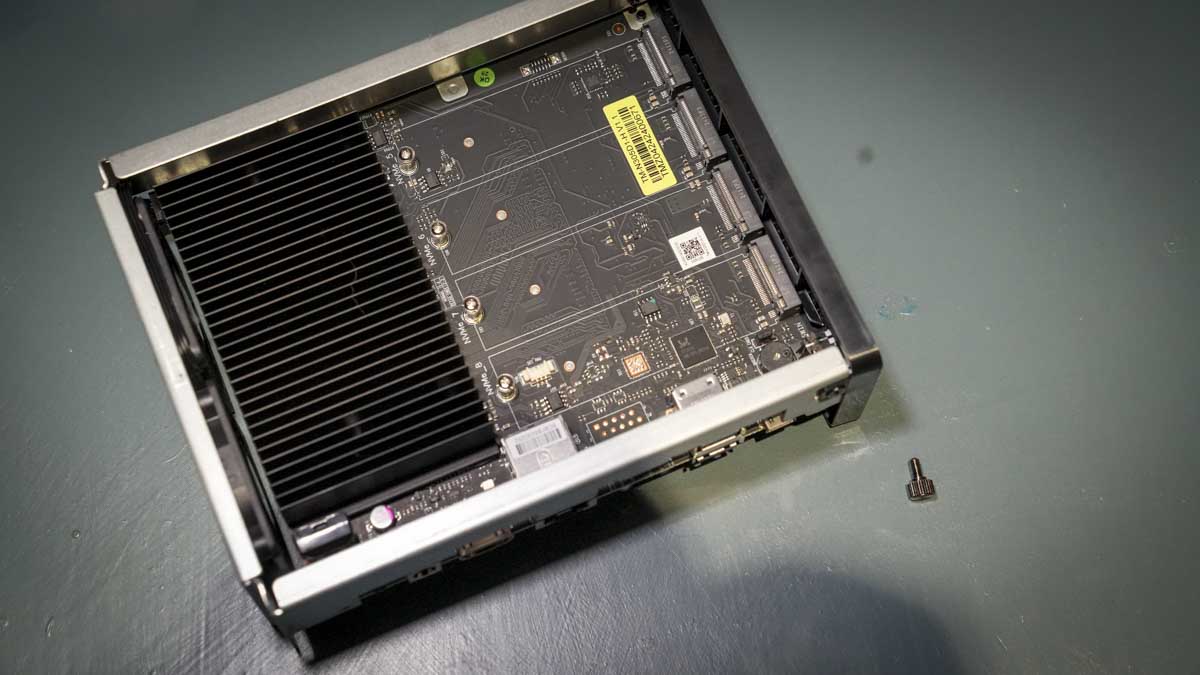
Running through the Terramaster F8 SSD Plus's features and the compact size stand out. That small size of 177 x 160 x 140 mm, means it will sit neatly on a shelf or on your desk without taking up too much room unlike many other NAS boxes. It also means that, without moving mechanical parts as you would usually expect with HDD NAS systems, the size, weight, and lack of delicate drives make it highly portable, which will interest photographers and videographers who often work in teams and benefit from a shared drive resource in the field.
When it comes to setup and use, the NAS is almost tool-free, with the outer casing easily removable. It's secured with a single thumb screw that can be quickly removed before the outer casing is lifted clear of the electronics. Once the inside is revealed, the small crosshead screwdriver supplied is required to install the SSDs.
Regarding SSD size, it takes M.2 NVMe 2280-sized modules up to 8TB each, and with eight slots, you get a maximum of 64TB of possible data. However, this will leave you without the protection that a decent RAID setup on a NAS system typically offers.
Powering the small NAS is an impressive Intel i3 N305 processor with a max burst frequency of up to 3.8 GHz. This is partnered with 16GB DDR5 Non-ECC SODIMM RAM and this is expandable to 32GB which would be a good idea if you're going to use it for video. This is one of the interesting features for video teams about the F8 Plus which has the ability to handle video transcoding and can process H.264, H.265, MPEG-4, and VC-1 with a maximum resolution of 4K (4096 x 2160) and a maximum frame rate of 60 per second.
Enabling this and many of the other features is the TOS 6 operating system, which allows you to interact with the NAS settings, as well as download apps and features that extend this NAS’s uses well beyond simple storage. Applications such as Plex, Docker, and CloudSync cater to a variety of different uses.
There's also plenty of scope to use the F8 SSD Plus as an extension of other systems. For example, video editors using the OWC Jellyfish network solution can plug the F8 SSD Plus in to expand that drive's storage even further.
When it comes to speed, this is where the F8 SSD really excels, first by harnessing the speed and power of the SSD format, but also by allowing you to select the RAID type you want for the drive. If you want speed for video editing, RAID 0 is an ideal solution, and for security, RAID 1 is a great option.
While RAID balances performance and speed, the F8 SSD Plus also stands out with its 10GbE networking potential. This, of course, requires a network capable of these speeds, but again will be of interest to videographers and photographers looking for a wired network solution for file storage and network editing. Through both the network port and USB networking when connected to other network systems a speed of 10Gbps is possible enabling transfer rates of 1020MB/s read and 300MB/s write.
The NAS drive also features three USB ports that allow you to connect to other NAS and network systems simply by plugging in and connecting. This can be a relatively inexpensive and straightforward way to boost the storage capacity of drives such as the OWC Jellyfish, but also for slower HDD NAS systems, it suddenly gives them a fast access solution that runs alongside the larger, slower-capacity storage. What is surprising is how quiet the drive is, with a quoted noise rating of just 19dB(A) — this is due to the solid-state nature of most of the hardware.
Finally, Terramaster has ensured that the F8 SSD Plus has maximum compatibility with Mac, PC, and Linux systems, with the ability to configure the storage as required.
- Features: 4/5
Terramaster F8 SSD Plus: Performance
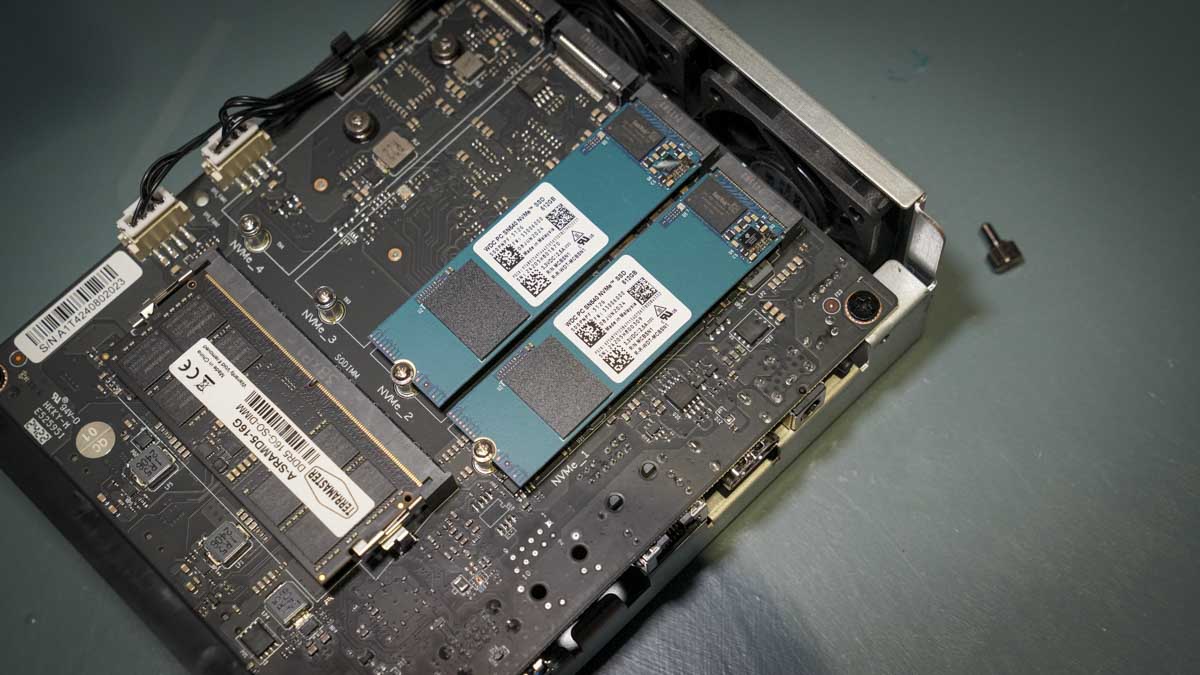
Getting started with the Terramaster F8 SSD Plus is straightforward, and while it may not be plug-and-play, it's fast and easy enough that most people should be able to get up and running in a matter of minutes, without too many issues. The first step is to install the SSDs, and this process involves unscrewing the thumb screw from the back which then enable the casing to be lifted away. The SSDs can then be slotted into place before being secured with cross-type screws.
With that first procedure completed, the NAS can be plugged into the network and configured using the browser interface. What's really nice here is that Terramaster has created a very straightforward approach to the NAS system. Once you're into the interface, you can set up the drive for your intended use, whether it’s performance or security for your files. The whole process should take less than 20 minutes.
Other features and apps we tested were quick to install, with highlights being TerraSync, which enables you to back up and sync your computers files and folders to the NAS and then to an online storage solution in one go. Downloading and setup take a while to ensure that you're correctly logged into your online account. What's great here is that while the TOS 6 GUI is simple, it does allow you to navigate options and settings with relative ease.
However, through testing some of the apps, such as CloudSync, some connections, such as to Google Drive, were blocked. However, setting up an Amazon S3 bucket for storage or utilising the Dropbox option was straightforward.
During testing, we used the NAS box in the studio on a 2.5 Gbps wired network as well as through the wireless network attached to an Eero 6 router. Checking out the transfer rates through both connections showed the NAS’s potential, with the Wi-Fi connection reaching read speeds of 40MB/s and write speeds of 30MB/s. Using the wired network, speeds increased to 110MB/s read and 100MB/s write to a MacBook Pro M1 Max using a UGREEN 5 Gbps USB Type-C adapter.
While the speeds we recorded lagged behind those quoted by Terramaster, they are at the upper end of the studio equipment when tested. With a more up-to-date network, the 10Gbps speed of both the USB and network ports will enable read speeds of up to 1020MB/s and write speeds of 300MB/s—more than enough for 4K network video editing for small productions. During the test utilising the older network, 1080p video edits using Adobe Premiere Pro were quick and possible, with a few more advanced adjustments to the F8 SSD configuration.
- Performance: 4.5/5
Should you buy the Terramaster F8 SSD Plus?
Throughout testing, the F8 SSD Plus impressed with its speed and ease of use, whether connected directly through the network or wirelessly. The NAS drive provided a robust connection with consistent speeds. What was most impressive was the quiet running of the NAS compared to our existing system, which uses HDDs rather than the faster SSDs. From the initial startup process to short network HD video edits, the drive remained extremely quiet, with only the faintest noise from the fans, and the performance remained consistent throughout.
| Row 0 - Cell 0 | Row 0 - Cell 1 | Row 0 - Cell 2 |
| Value | Pricey, but worth it for performance | 4 |
| Design | Compact, quiet, and professional look | 4 |
| Features | Impressive connectivity and flexible RAID configurations | 4 |
| Performance | Fast, excellent for video editing workflows | 4.5 |
| Total | A solid NAS for speed and efficiency | 4.5 |
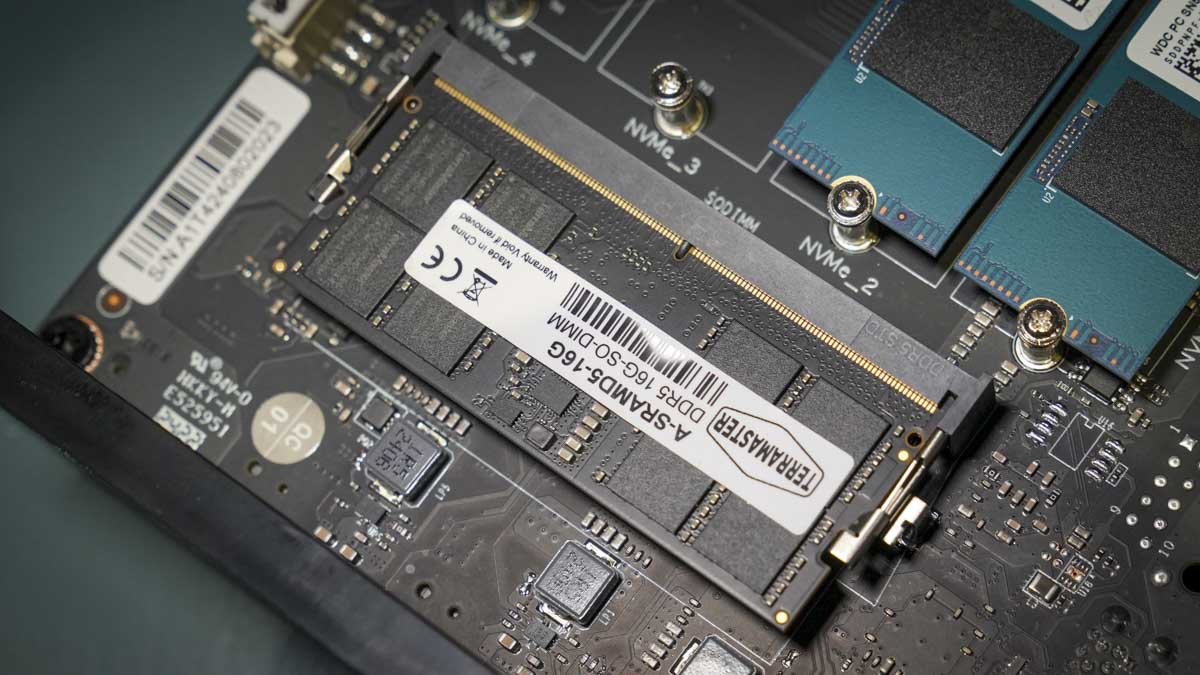
Buy it if...
Speed is your priority
If you need ultra-fast file access for video editing, or data-heavy tasks, the F8 SSD Plus excels. With SSD storage and 10GbE networking, it ensures smooth workflows, especially for creative professionals needing fast data transfer speeds.
You require flexible RAID configurations
This NAS is perfect if you need a range of RAID options for balancing speed and security. Whether you want speed with RAID 0 or data protection with RAID 5, the F8 SSD Plus gives you control over your storage setup.
Don't buy it if...
You're on a tight budget
If cost is a major concern, the price of the base unit plus additional SSDs may be too steep, especially compared to traditional HDD NAS systems that offer more affordable storage capacity.
You need integrated cloud services
If seamless cloud integration is crucial for your workflow, you might find the F8 SSD Plus limited, as we found some issues with integrating cloud services like Google Drive.
For more professional storage, we reviewed the best NAS devices.
